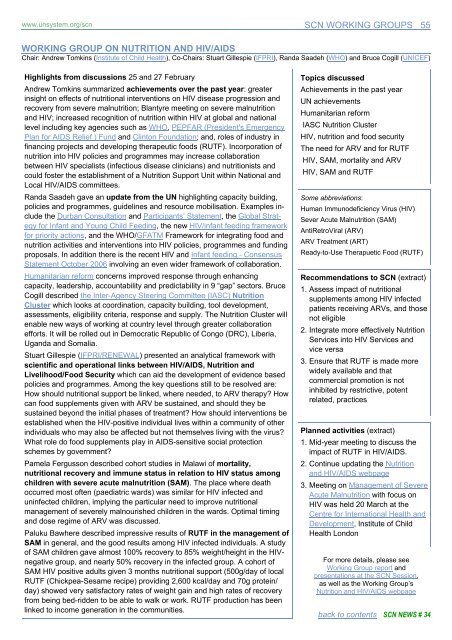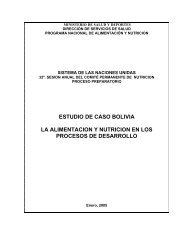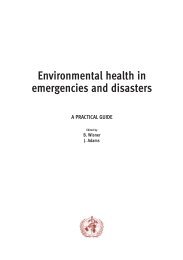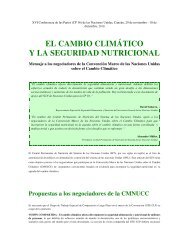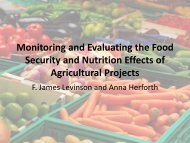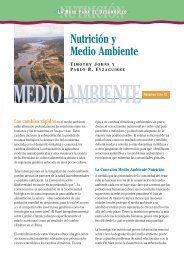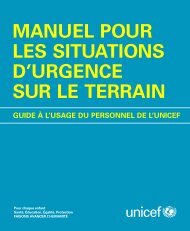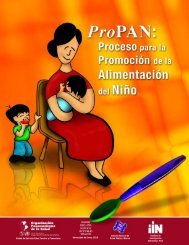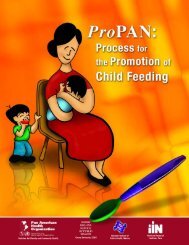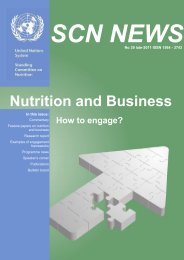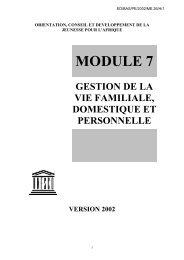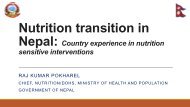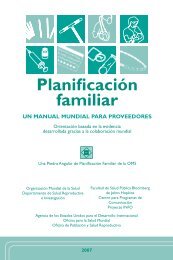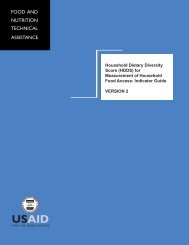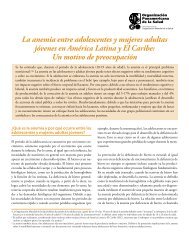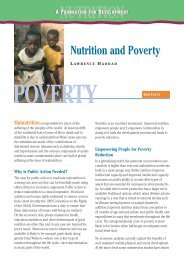SCN News No 34 - UNSCN
SCN News No 34 - UNSCN
SCN News No 34 - UNSCN
Create successful ePaper yourself
Turn your PDF publications into a flip-book with our unique Google optimized e-Paper software.
www.unsystem.org/scn <strong>SCN</strong> WORKING GROUPS 55<br />
WORKING GROUP ON NUTRITION AND HIV/AIDS<br />
Chair: Andrew Tomkins (Institute of Child Health), Co-Chairs: Stuart Gillespie (IFPRI), Randa Saadeh (WHO) and Bruce Cogill (UNICEF)<br />
Highlights from discussions 25 and 27 February<br />
Andrew Tomkins summarized achievements over the past year: greater<br />
insight on effects of nutritional interventions on HIV disease progression and<br />
recovery from severe malnutrition; Blantyre meeting on severe malnutrition<br />
and HIV; increased recognition of nutrition within HIV at global and national<br />
level including key agencies such as WHO, PEPFAR (President's Emergency<br />
Plan for AIDS Relief ) Fund and Clinton Foundation; and, roles of industry in<br />
financing projects and developing therapeutic foods (RUTF). Incorporation of<br />
nutrition into HIV policies and programmes may increase collaboration<br />
between HIV specialists (infectious disease clinicians) and nutritionists and<br />
could foster the establishment of a Nutrition Support Unit within National and<br />
Local HIV/AIDS committees.<br />
Randa Saadeh gave an update from the UN highlighting capacity building,<br />
policies and programmes, guidelines and resource mobilisation. Examples include<br />
the Durban Consultation and Participants’ Statement, the Global Strategy<br />
for Infant and Young Child Feeding, the new HIV/infant feeding framework<br />
for priority actions, and the WHO/GFATM Framework for integrating food and<br />
nutrition activities and interventions into HIV policies, programmes and funding<br />
proposals. In addition there is the recent HIV and Infant feeding - Consensus<br />
Statement October 2006 involving an even wider framework of collaboration.<br />
Humanitarian reform concerns improved response through enhancing<br />
capacity, leadership, accountability and predictability in 9 “gap” sectors. Bruce<br />
Cogill described the Inter-Agency Steering Committee (IASC) Nutrition<br />
Cluster which looks at coordination, capacity building, tool development,<br />
assessments, eligibility criteria, response and supply. The Nutrition Cluster will<br />
enable new ways of working at country level through greater collaboration<br />
efforts. It will be rolled out in Democratic Republic of Congo (DRC), Liberia,<br />
Uganda and Somalia.<br />
Stuart Gillespie (IFPRI/RENEWAL) presented an analytical framework with<br />
scientific and operational links between HIV/AIDS, Nutrition and<br />
Livelihood/Food Security which can aid the development of evidence based<br />
policies and programmes. Among the key questions still to be resolved are:<br />
How should nutritional support be linked, where needed, to ARV therapy? How<br />
can food supplements given with ARV be sustained, and should they be<br />
sustained beyond the initial phases of treatment? How should interventions be<br />
established when the HIV-positive individual lives within a community of other<br />
individuals who may also be affected but not themselves living with the virus?<br />
What role do food supplements play in AIDS-sensitive social protection<br />
schemes by government?<br />
Pamela Fergusson described cohort studies in Malawi of mortality,<br />
nutritional recovery and immune status in relation to HIV status among<br />
children with severe acute malnutrition (SAM). The place where death<br />
occurred most often (paediatric wards) was similar for HIV infected and<br />
uninfected children, implying the particular need to improve nutritional<br />
management of severely malnourished children in the wards. Optimal timing<br />
and dose regime of ARV was discussed.<br />
Paluku Bawhere described impressive results of RUTF in the management of<br />
SAM in general, and the good results among HIV infected individuals. A study<br />
of SAM children gave almost 100% recovery to 85% weight/height in the HIVnegative<br />
group, and nearly 50% recovery in the infected group. A cohort of<br />
SAM HIV positive adults given 3 months nutritional support (500g/day of local<br />
RUTF (Chickpea-Sesame recipe) providing 2,600 kcal/day and 70g protein/<br />
day) showed very satisfactory rates of weight gain and high rates of recovery<br />
from being bed-ridden to be able to walk or work. RUTF production has been<br />
linked to income generation in the communities.<br />
Topics discussed<br />
Achievements in the past year<br />
UN achievements<br />
Humanitarian reform<br />
IASC Nutrition Cluster<br />
HIV, nutrition and food security<br />
The need for ARV and for RUTF<br />
HIV, SAM, mortality and ARV<br />
HIV, SAM and RUTF<br />
Some abbreviations:<br />
Human Immunodeficiency Virus (HIV)<br />
Sever Acute Malnutrition (SAM)<br />
AntiRetroViral (ARV)<br />
ARV Treatment (ART)<br />
Ready-to-Use Therapuetic Food (RUTF)<br />
Recommendations to <strong>SCN</strong> (extract)<br />
1. Assess impact of nutritional<br />
supplements among HIV infected<br />
patients receiving ARVs, and those<br />
not eligible<br />
2. Integrate more effectively Nutrition<br />
Services into HIV Services and<br />
vice versa<br />
3. Ensure that RUTF is made more<br />
widely available and that<br />
commercial promotion is not<br />
inhibited by restrictive, potent<br />
related, practices<br />
Planned activities (extract)<br />
1. Mid-year meeting to discuss the<br />
impact of RUTF in HIV/AIDS.<br />
2. Continue updating the Nutrition<br />
and HIV/AIDS webpage<br />
3. Meeting on Management of Severe<br />
Acute Malnutrition with focus on<br />
HIV was held 20 March at the<br />
Centre for International Health and<br />
Development, Institute of Child<br />
Health London<br />
For more details, please see<br />
Working Group report and<br />
presentations at the <strong>SCN</strong> Session,<br />
as well as the Working Group’s<br />
Nutrition and HIV/AIDS webpage<br />
back to contents <strong>SCN</strong> NEWS # <strong>34</strong>


